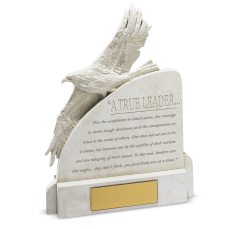Employee Recognition Frequently Asked Questions
Why is Employee Recognition Important?
Employee Recognition increases employee engagement and retention which then increases productivity. Employees who are engaged and invested in their work produce better results and are more likely to withstand temptation to leave. Organizations that implement employee awards see up to an 87% increase in retention. Managers who recognize employees can see increase engagement levels by 60% can see a 20% increase in productivity and with 2x the quality of service and sales.
- Creates a Positive working environment that encourages employees to thrive
- Contributes to higher employee morale and increases organizational productivity
- Reinforces enthusiasm, commitment, and social conscience of employees
What Effect Does Recognition Have on Employees?
Employees who receive formal recognition awards have a sense of pride in their work and is a value add to their paycheck in a positive work environment that fosters open communication of appreciation.
- 39% of Employees are more productive
- 59% of Employee have a sense of increased motivation
- 73% of Employees report increased positive morale.
How Does Employee Recognition Effect Retention?
A recent Salary.com survey underscores the importance of employee recognition programs in increasing retention. The survey revealed that over 33% of departing employees cited "No Recognition" as a key reason for leaving their jobs. This figure is twice as high as all other benefits combined and ranks second only to inadequate compensation and lack of advancement opportunities.
How to Create an Employee Recognition Program?
Establish how performance is to be measured by figuring out for your goals what constitutes a reasonable target that balances the requirement for improved performance with attainment. The rules and measures of a recognition program should be understandable and easily produced and verified. You will need a degree of flexibility should circumstances arise that weren't foreseen or warrant a change.
- Define the Program's Scope and Direction
- Develop a Budget
- Establish Program Guidelines
- Communicate the Program
- Present the Awards
How to Budget Employee Awards?
The 5 things to consider when developing a budget for the program:
- Internal Administrative Costs
- Employee Award Trophy Costs
- Number of Recipients
- Shipping Costs to your Location or Direct to Recipients
- Ancillary Event Costs such as Food Expenses
What Award Products Do Employee Consider the Best for Recognition?
Successories surveyed 100s of organizations and found that although pins, certificates and plaques may be budget friendly for organization, Employees greatly prefer to be recognized with trophies.
- 52% Trophy Awards
- 16% Money
- 13% Plaques
- 12% Certificates
- 7% Medals & Pins
General Questions
- What is employee recognition? Employee recognition is acknowledging and appreciating an employee's hard work and achievements. It can boost morale, enhance productivity, and foster a positive workplace culture.
- Why is employee recognition important? Recognizing employees can improve job satisfaction, increase retention rates, and motivate employees to maintain high-performance levels.
- What are some common types of employee recognition? Common types of recognition include verbal praise, written commendations, awards, bonuses, and public acknowledgments during meetings or events.
- How often should employee recognition occur? Ideally, recognition should be ongoing. Regular acknowledgment, whether daily, weekly, or monthly, can reinforce positive behaviors and maintain high motivation.
- What are some affordable employee recognition ideas? Affordable options include handwritten thank-you notes, social media shoutouts, certificates, and small tokens of appreciation like gift cards or company merchandise.
Implementing Employee Recognition Programs
- How do I start an employee recognition program? Begin by setting clear objectives, determining criteria for recognition, and selecting suitable awards. Communicate the program to your team and gather feedback to refine it.
- What criteria should be used for employee recognition? Criteria include performance metrics, teamwork, innovation, leadership, and company values. Tailor these to your organization's specific goals.
- Who should be involved in the recognition process? While managers and HR typically lead recognition efforts, involving peers and senior leaders can create a more inclusive and impactful program.
- How can we ensure our recognition program is fair and unbiased? Establish clear, transparent criteria and encourage a culture of recognition from all levels. Regularly review the program to address any biases or inconsistencies.
- What are the best ways to recognize remote employees? Recognize remote employees through virtual shoutouts, e-cards, digital badges, online gift cards, and by involving them in virtual team celebrations.
Customization and Personalization
- How can we personalize employee recognition? Tailor recognition to individual preferences, whether through specific awards, personalized messages, or acknowledging achievements that align with their career goals.
- Can we recognize team achievements as well as individual contributions? Absolutely! Recognizing team efforts can strengthen collaboration and highlight the importance of teamwork in achieving organizational goals.
- What should a recognition award say? An award should include the employee's name, the specific achievement being recognized, and a message of appreciation. It should be sincere and specific.
- How can we involve employees in the recognition process? Encourage employees to nominate peers for recognition, provide feedback on the program, and participate in recognition events.
- What are some creative ways to recognize employees? Creative ideas include creating a recognition wall, offering unique experiences like lunch with the CEO, or implementing a "recognition day" with various activities and awards.
Measuring and Improving Recognition Programs
- How do we measure the effectiveness of our recognition program? Track metrics such as employee engagement scores, retention rates, and feedback from employee surveys to assess the program's impact.
- How can we gather feedback on our recognition program? Use anonymous surveys, suggestion boxes, and regular check-ins with employees to collect feedback and make necessary adjustments to the program.
- What should we do if an employee feels overlooked by the recognition program? Address the concern promptly by discussing it with the employee, reviewing the program's criteria, and ensuring future efforts are more inclusive.
- How can we keep our recognition program fresh and engaging? Regularly update the program with new awards, themes, and recognition methods. Engage employees in brainstorming sessions for fresh ideas.
- What are some examples of successful employee recognition programs? Examples include point-based reward systems, employee of the month awards, and peer-to-peer recognition platforms. Highlighting case studies from other companies can also inspire.

































